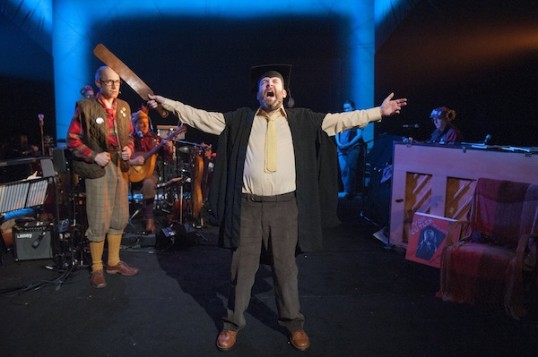The Beautiful Cosmos of Ivor Cutler – Review
✭✭✭✭✩ Slightly imperfect
Traverse Theatre Tues 29 April – Sat 3rd May 2014
Infectious and entertaining, The Beautiful Cosmos of Ivor Cutler is an engaging production whose flaws do not detract from its essential likeability.
Director Matthew Lenton conceived the piece as a tribute to the late Glasgow-born writer, humorist and musician, with Sandy Grierson (who appears as Cutler) and the rest of the cast creating a text which is largely drawn from Cutler’s own words.
Ivor Cutler was one of those artists who had a wide variety of admirers, famously being at home on Radios 1, 2, 3 and 4, and an equally wide variety of people who did not appear to ‘get’ him at all. When he is not dismissed as ‘someone who appeared with the Beatles’, Cutler is often summed up airily as some kind of ‘surrealist’, a judgement that does no one any favours.
Admittedly his work contains a healthy dose of music-hall absurdism leavened with Glasgow Zen, and often hints at the Eastern European Jewish mysticism that informed the writings of Kafka which Cutler so admired. However, it is generally much more realistic than is often admitted. Cutler’s clear-eyed, unhypocritical, childlike observations of life are consistently more beautiful and terrifying than mere mortals can tolerate. Life In A Scotch Sitting Room and Glasgow Dreamer may be considered fantasy outwith Scotland, but to many Scots they are almost a documentary.
The National Theatre of Scotland and Vanishing Point’s production does very well in illustrating this strange hyper-realism at times. Apparently whimsical songs like Squeeze Bees or the Beautiful Cosmos of the title are shown to be realistic portraits of the relationship between Cutler and his long-term partner Phyllis King which forms the centre of the play, while the young Ivor’s suffering at the hands of anti-Semitic teachers is all the more affecting for being more obliquely rendered.
Indeed, the nearer the play goes towards straight biography the weaker it becomes. The use of interviews with King to provide a framing device seems to be a somewhat desperate attempt to provide structure, which is so often the case with ‘devised’ or collaborative pieces.
The apparent biographical nature of the piece is undercut by some omissions, and other misleading impressions – for example, Cutler is shown apparently leaving teaching when he leaves Scotland, whereas he continued to teach for many years in England. The greatest misjudgement is the portrayal of an aged, frail Cutler in a nursing home, which seems intrusive and unnecessary when dealing with such a short part of his life compared to his forty-year-plus career in writing and performing.
“…fun to be had when things become most unpredictable…”
There is also a great deal to enjoy, however, with constantly clever staging, Kai Fischer’s inventive set and lighting design, and some excellent performances. The presence of five musicians is a little distracting at first, but soon proves to be a strength. Sandy Grierson’s winning turn as Cutler is more impressionistic than a straight impersonation and all the better for it, even if his interaction with the audience is much chummier than the somewhat forbidding figure Cutler could sometimes cut on stage.

Ed Gaughan “achieves a deep and monstrous truth” as sadistic, Lochgelly tawse-loving teacher. Photo © Tim Morozzo
It is not surprising that his renditions of some of the more familiar pieces edge into (pale) imitation – whereas the full-band numbers cast the work in a new light, notably a gleeful Doughnut In My Hand, and the aforementioned Cosmos, where musical director James Fortune appears to be channelling Stuart Staples of Tindersticks. The arrangements are both tasteful and exciting, often bringing out the hints of what came to be called ‘world music’ but which fascinated Cutler long before that term was ever invented.
There is most fun to be had when things become most unpredictable – gleeful Russian dancing, pantomimic touches when things (apparently) go wrong and a huge sense of infectious enjoyment. Guitarist Ed Gaughan plays several characters who interact with Cutler in a variety of accents. While the straight impersonations are a touch imperfect, when he essays a more stand-alone character he is very successful. His Ned Sherrin escapes from imitation to become believable, while his Lochgelly tawse-loving sadistic teacher achieves a deep and monstrous truth.
Elicia Daly’s Phyllis King is a quite magnificent performance. It is not just the way that, without counterfeiting King’s voice, she manages to convey her distinctive cadences and stress patterns, but also that she manages a rare combination of poised stillness and impish fun.
It is this combination of fun and beauty which is most fitting a tribute to the man in question, and while it perhaps does not do him justice, it is difficult to imagine what could. Even if all it manages is to introduce a few more people to Cutler’s works it would have been well worth doing.
Running time 2 hours 20 minutes (including interval)
Run ends Saturday 2 May 2014
Evenings 7.30 pm, matinee Sat 2.30 pm.
Traverse Theatre, 10 Cambridge Street EH1 2ED
Details from: www.traverse.co.uk (The run is officially sold out – returns on the door only.)
There are more of Tim Morozzo’s photos of the production in Æ’s First Look Photo Feature here: alledinburghtheatre.com.
ENDS





















